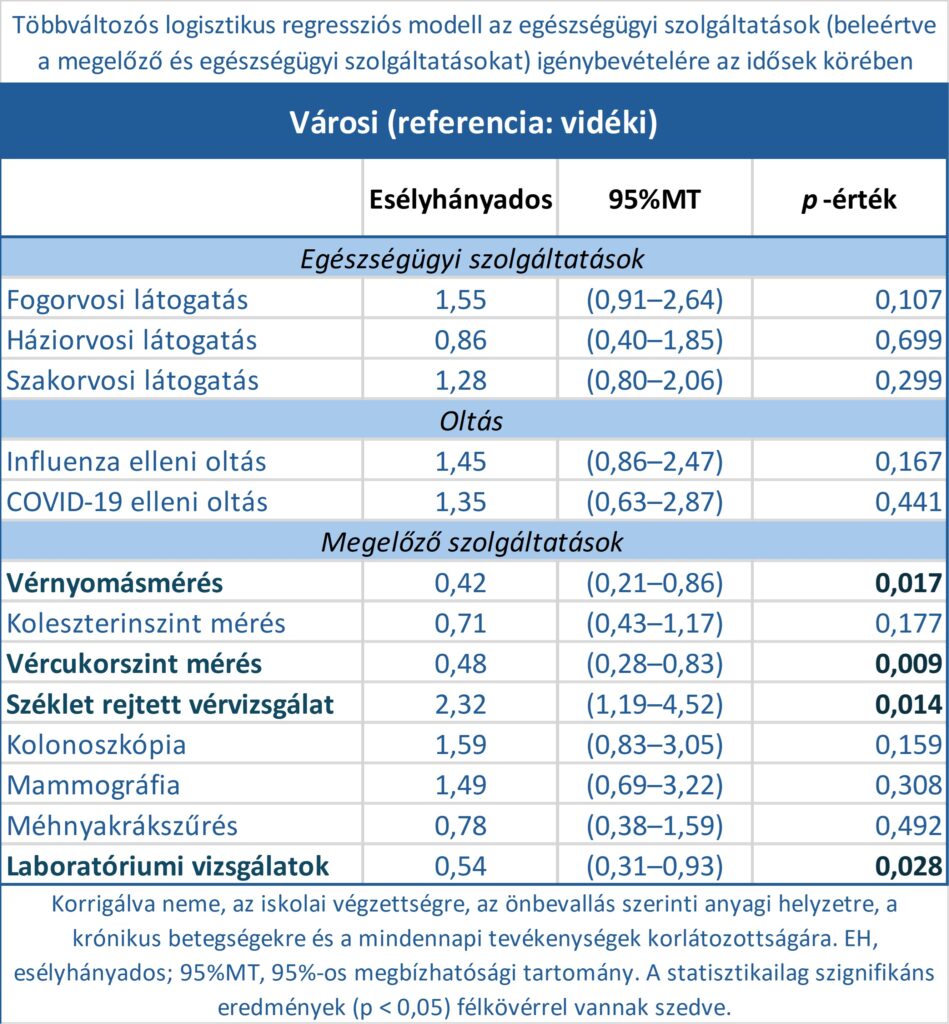Az idősödő népesség arányának növekedése világszerte észlelhető demográfiai folyamat. A közép- és kelet-európai országokban ez az átalakulás jelentős kihívás az egészségügyi ellátórendszerek számára. A tanulmányban a leghátrányosabb helyzetű magyar régió városi és vidéki területein élő idősek egészségi állapotának és az egészségügyi szolgáltatások igénybevételének összehasonlítását végezték el egy 2022-ben Északkelet-Magyarországon a szerzők által tervezett és 443 idős felnőtt (≥ 65 év) véletlenszerűen kiválasztott mintáján elvégzett átfogó felmérés eredményei alapján 443 idős felnőtt (≥ 65 év) véletlenszerűen kiválasztott mintáján.
A városi idősek (27,8%; vidék:19,7%) értékelték nagyobb arányban egészségi állapotukat nagyon jónak vagy jónak, míg a mindennapi tevékenységeik korlátozottságát a vidékiek (63,5%; város: 52,6%) jelezték nagyobb gyakorisággal. A többváltozós logisztikus regressziós elemzések eredményei szerint a városi lakosság esetében nagyobb valószínűséggel történt meg az okkult vérzés kimutatását célzó székletvizsgálat, vidéken pedig vérnyomás és vércukorszint mérés volt gyakoribb. Ezen eredmények rámutatnak a magyar időskorú népesség körében a lakóhely és az egészségügyi szolgáltatások igénybevételének összefüggéseire, s a kielégítetlen szükségletek azonosítását is lehetővé teszi. Fontos megjegyezni, hogy a magas korai halálozási arány a vidéki lakosok körében azt eredményezheti, hogy a legveszélyeztetettebb népességcsoportok már be sem kerülhettek ebbe a vizsgálatba, ami alapján az idős vidéki lakosság egészségi állapota a ténylegesnél kedvezőbbnek tűnhet a vizsgálat eredményei alapján.
Comparative analysis of health status and health service utilization patterns among rural and urban elderly populations in Hungary: a study on the challenges of unhealthy aging
Nora Kovacs (Department of Public Health and Epidemiology, Faculty of Medicine, University of Debrecen; 2ELKH-DE Public Health Research Group, Department of Public Health and Epidemiology, Faculty of Medicine, University of Debrecen),
Peter Piko (Department of Public Health and Epidemiology, Faculty of Medicine, University of Debrecen; Center for Epidemiology and Surveillance, National Laboratory for Health Security, Semmelweis University),
Attila Juhasz (Center for Epidemiology and Surveillance, National Laboratory for Health Security, Semmelweis University),
Csilla Nagy (Center for Epidemiology and Surveillance, National Laboratory for Health Security, Semmelweis University),
Beatrix Oroszi (Center for Epidemiology and Surveillance, National Laboratory for Health Security, Semmelweis University),
Zoltan Ungvari (Vascular Cognitive Impairment and Neurodegeneration Program, Oklahoma Center for Geroscience and Healthy Brain Aging, Department of Biochemistry and Molecular Biology, University of Oklahoma Health Sciences Center; Department of Health Promotion Sciences, College of Public Health, University of Oklahoma Health Sciences Center; International Training Program in Geroscience, Doctoral School of Basic and Translational Medicine, Departments of Public Health and Translational Medicine, Semmelweis University; The Peggy and Charles Stephenson Cancer Center, University of Oklahoma Health Sciences Center),
Roza Adany (Department of Public Health and Epidemiology, Faculty of Medicine, University of Debrecen; ELKH-DE Public Health Research Group, Department of Public Health and Epidemiology, Faculty of Medicine, University of Debrecen; Center for Epidemiology and Surveillance, National Laboratory for Health Security, Semmelweis University; Department of Public Health, Semmelweis University)
Abstract
The demographic transition poses a significant challenge for health systems, especially in Central and Eastern European (CEE) countries, where the healthcare needs of aging populations are on the rise. This study aimed to describe and compare the health status and utilization of health services among the elderly residing in urban and rural areas of the most deprived region in Hungary. A comprehensive health survey was conducted in 2022, involving a randomly selected sample of 443 older adults (≥ 65 years) in Northeast Hungary. Multivariable logistic regression models adjusting for age, sex, education, financial status, chronic diseases, and activity limitations were used to investigate the association between type of residence and health service use. Among the study participants, 62.3% were female, 38.3% attained primary education, 12.5% reported a bad or very bad financial situation and 52.6% lived in urban areas. Overall, 24% of the elderly rated their health as very good or good (27.8% in urban and 19.7% in rural areas), while 57.8% (52.6% and 63.5% in urban and rural areas) reported limitations in daily activities. Compared to urban residents, rural residents reported lower rates of dentist visits (p = 0.006), specialist visits (p = 0.028), faecal occult blood testing (p < 0.001), colorectal cancer screening with colonoscopy (p = 0.014), and breast cancer screening (p = 0.035), and a higher rate of blood pressure measurement (p = 0.042). Multivariable models indicated that urban residence was positively associated with faecal occult blood testing (OR = 2.32, p = 0.014), but negatively associated with blood pressure (OR = 0.42, p = 0.017) and blood glucose measurements (OR = 0.48, p = 0.009). These findings highlight the influence of residence on health service utilization among older adults in Hungary. Further comprehensive studies are needed to better understand the health needs of the elderly population and to develop policies aimed at promoting healthy aging in CEE countries.
Geroscience. 2023 Oct 6., GeroScience 46 , 2017–2031 (2024) https://doi.org/10.1007/s11357-023-00926-y
Készítette az 
RRF-2.3.1-21-2022-00006 Egészségbiztonság Nemzeti Laboratórium projekt 